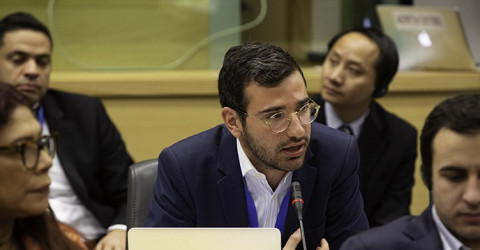
GCED Basic Search Form
Quick Search
You are here
News

"The right to education should not depend on the size of anyone's wallet or socioeconomic background, and therefore we need to continue our fight towards ensuring that education is seen as a public good"
Meet Robert Napier from Malta, youth and student representative at the Global Education Meeting 2018. He is a passionate young leader who is the President of the European Students’ Union (ESU). Robert has been involved in the student movement for more than four years and has served on the National Students’ Council in Malta as Social Policy Commissioner, Secretary-General and President. His main areas of work within ESU are Social Dimension (including Sustainable Development Goals), the Bologna Follow Up Group, the cooperation with other organisations such as the Council of Europe, EUROSTUDENT, the E4 Group and UNESCO, as well as the European Education Area.
Ahead of his participation at the “Relevant, equitable and inclusive quality education for all: an imperative for the 21st century” event at the High-level Political Forum in New York on 15 July, Robert answered five questions on the youth perspective of Sustainable Development Goal 4 (SDG 4).
How do you see the right to education being threatened today ?
The threats to education are various; from the privatisation of the sector to inequalities in access and completion to restrictions on academic freedom and institutional autonomy, just to mention a few. Education is a basic human right, however many still fail to see this reality. By adding barriers for accessibility, both direct and indirect, we are depriving individuals of reaching their potential and being catalysts of change in this world. The right to education should not depend on the size of anyone's wallet or socioeconomic background, and therefore we need to continue our fight towards ensuring that education is seen as a public good for which governments take the necessary responsibility.
UNESCO is working on a global higher education convention that will allow learners more mobility, and allow for their qualifications to be recognized across borders – how do you see this helping youth?
In this day and age, mobility is an essential tool in order to foster constructive dialogue exchange in a multicultural environment. Intercultural competence and understanding, as well as democratic values and skills and language competences are needed in the globalised world and the key for development of a society where everyone can live together peacefully. I believe that such global convention will help improve the quality of education by increasing international outlooks and circulating knowledge, as well as building intercultural understanding, independence, and transversal skills in students.
What does inclusion in higher education mean to you?
Inclusion has many facets, but unfortunately often we only scratch the surface and think we are speaking of holistic inclusion. To start off inclusion in higher education means the removal of access and transition barriers, as well as barriers that exist or co-exist within the higher education society on a day to day basis. To speak of holistic inclusion, the inclusion and involvement of students, as well as their representation, must be ensured within all levels of the education community. This includes accommodation support, if needed, provision of practical information and support, with the process of adaptation, which requires good introductory activities and measures to promote the inclusion of all, regardless of the individual profile or background.
We’re not on track to meet the education goals – in your opinion, what should be considered priority to succeed?
The realisation that we are not on track is already a very good step forward because there is nothing worse than being delusional about where we stand. I think we need to start by focusing on peer support from one country to another. We need to be brave enough to realise that admitting that we are not on track is not something to be ashamed of but rather something we should use to learn from one another. Certain countries have made massive strides when it comes to education, and others have over focused on trivial issues that do not solve the bigger picture. Personally, I believe that our primary aim should be to leave no one behind, which means that a lot of effort is needed to reduce the inequalities that exist and give everyone the right to access quality education. We need to change the mentality to be centered around education. I dare say that SDG 4 is the most crucial of all SDGs, as it is only through the power of education that we can resolve all other issues. So if you ask me, I would say that if need be, drop everything else, and focus everyone's energy on creating quality education. The rest of the Goals will be attained through the transformation that education will bring about.
What can young people do to put pressure on governments to keep on track?
Young people and civil society in general play a crucial role in keeping governments grounded and in check. I strongly encourage young people to join forces with Civil Society Organisations and fight for the bigger picture. As a young person, I understand the struggle of remaining hopeful, especially in turbulent times when nothing seems to be on track. However, remember that your voice is crucial and strong. It might not feel that way, but we are the strongest voice and governments do listen when we speak. Do not let any government convince you that you are the future - you are the present, and the only ones with enough energy, determination and power to bring about the right change. What we sow now, we'll reap tomorrow - so let's make sure to be better human beings and prepare a better world for ourselves today, and for our kids tomorrow.
URL:
https://en.unesco.org/news/5-questions-youth-education-advocate
